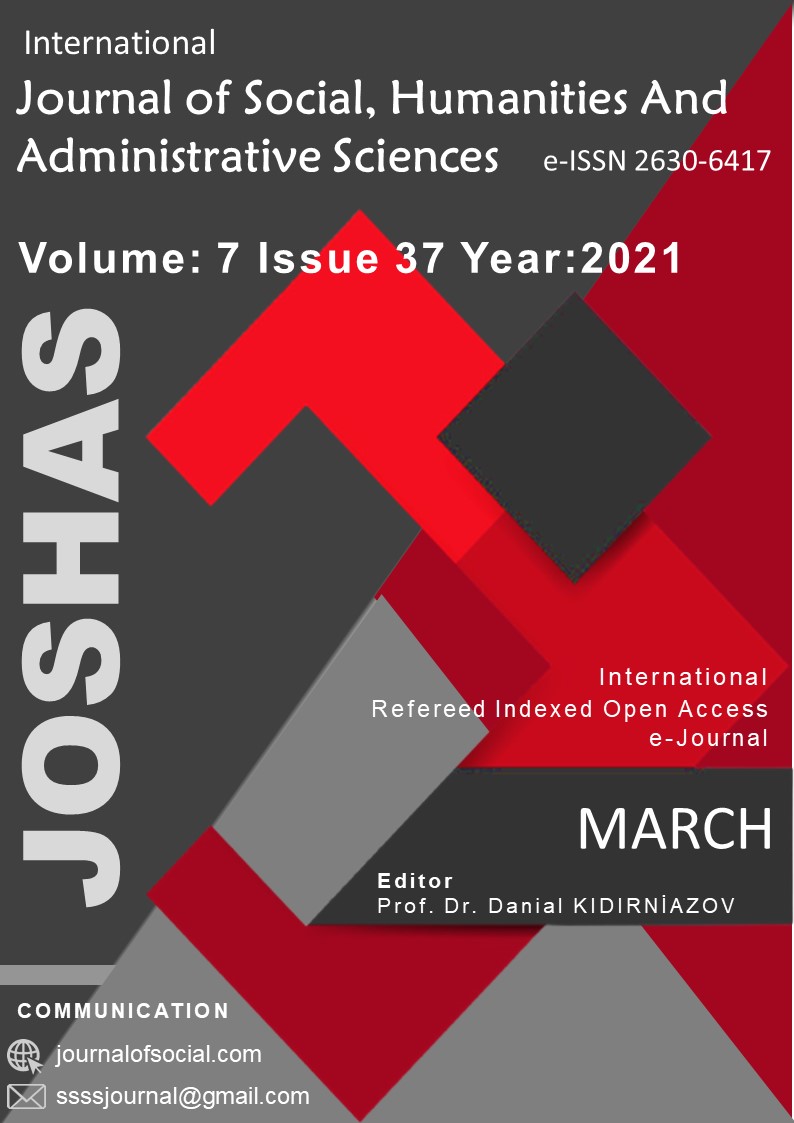Author :
Abstract
Arşiv malzemeleri sadece siyasi olaylarla sınırlı kalmayan çok sayıda yaşanmışlığın izlerini bize sunmaya hazır yığınla bilgiyle doludur. Hatta bunların birçoğu görmezden dahi gelemeyeceğimiz kadar tarihin bariyerlerini aşıp birer olgu haline gelmeyi başarmış durumdadır. Bunlar sıradan insanların tecrübelerini görüş alanımızın dışında tutamayacağımız, tepkisiz kalmamızı engelleyecek nitelikte. İşte bu noktada kadınların maruz kaldığı hazin tecrübeler Osmanlı toplumsal ve ahlaki normlarının muhafazakâr bakış açısına takılmış durumdadır. Bu araştırma toplumsal cinsiyet ve ahlaksal bakışla sarmalanmış kadının toplumsal kimliğinin meşruluğuna yönelik farkındalık yaratma arzusuyla hareket eden çalışmalara örnek olması niyetiyle kaleme alınacaktır. Bu makale, Osmanlı İmparatorluğu’nda 8-18 Kasım 1838 tarih aralığında ilk defa bir kanun tasarısı ile gündeme getirilen çocuk düşürme vakalarında adli sürecin nasıl işlediğine değinmeği amaçlamıştır. Bütünüyle adli vaka halinde seyreden ve kadına şiddete bağlı gelişen çocuk düşürme vakalarına anlamlı ve yerinde bir müdahalenin olup olmadığına dair kayda geçirilmiş örnekleri yansıtma gayesiyle hareket ederek. Bu bağlamda Osmanlı Arşivi’nde tespit ettiğimiz vesika grupları araştırmaya rehberlik etmiştir.
Keywords
Abstract
Archive materials are full of information ready to present us with traces of many experiences that are not limited to political events. In fact, many of them have managed to overcome the barriers of history and become phenomena that we cannot even ignore. These are such that we cannot keep the experiences of ordinary people out of our field of vision and prevent us from remaining unresponsive. At this point, the sad experiences women were subjected to have been caught in the conservative perspective of Ottoman social and moral norms. This research will be written with the intention of setting an example for studies that act with the desire to create awareness of the legitimacy of women's social identity surrounded by gender and moral perspectives. This article aims to address how the judicial process works in misccariage cases brought to the agenda with a bill for the first time between 8-18 November 1838 in the Ottoman Empire. Acting with the aim of reflecting the recorded examples of whether there is a meaningful and appropriate intervention in abortion cases that are progressing as a purely forensic case and developed due to violence against women. In this context, the document groups that we identified in the Ottoman Archive guided the research.
Keywords
- Akgündüz, A. (1986). Mukayeseli İslam ve Osmanlı Hukuk Külliyâtı, Diyarbakır.
- Akgündüz, A. (1990). Osmanlı Kanunnâmeleri ve Hukukî Tahlilleri, C. 1, Fey Vakfı Yayınları, İstanbul.
- Akyıldız, A. (1993). Tanzimat Dönemi Osmanlı Merkez Teşkilatında Reform (1836-1856), İletişim Yay., İstanbul.
- Akyıldız, A. (2010), “Şûrâ-yı Devlet”, Türkiye Diyanet Vakfı İslam Ansiklopedisi, C. 39, İstanbul: 236-239. Altınay, A. R. (2000). Kadınlar Saltanatı, Tarih Vakfı Yurt Yayınları, İstanbul.
- Bardakoğlu, A. (1994), “Diyet”, Türkiye Diyanet Vakfı İslam Ansiklopedisi, C. 9, İstanbul: 473-479.Başoğlu, T. (2011). “Ta’zîr”, Türkiye Diyanet Vakfı İslam Ansiklopedisi, C. 40, İstanbul: 198-202.
- Canatar, M. (1997). “Şûrâ-yı Devlet Teşkilatı ve Tarihi Gelişimi Üzerine Bazı Tespitler”, İlmi Araştırmalar, S. 5, İstanbul: 107-139.
- Cin, H.-Akgündüz, A. (1990). Türk Hukuk Tarihi, C. I, İstanbul.
- Davis, F. (2006) Osmanlı Hanımı, çev. Bahar Tırnakçı, Yapı Kredi Yayınları, İstanbul.
- Devellioğlu, F. (2001). Osmanlıca-Türkçe Ansiklopedik Lûgat, Aydın Kitabevi, Ankara.
- Dursun, K. (2010). II. Bayezid’in Annesi Gülbahar Hatun’un Hayatı ve Vakıfları, Gazi Osman Paşa Üniversitesi Sosyal Bilimler Enstitüsü, Yayınlanmamış Doktora Tezi.
- Gerber, H. (1998). “Bir Osmanlı Şehri Olan Bursa’da Kadının Sosyo-Ekonomik Statüsü (1600-1700)”, çev. Hayri Erten, Selçuk Üniversitesi İlahiyat Fakültesi Dergisi, S. 8, Konya: 327-343.
- Hanilçe, M. (2011). “Şeriye Sicillerine Göre XIX. Yüzyıl Başlarında Tokat’ta Giyim”, Türkiyat Araştırmaları Dergisi, S. 30, Konya: 423-455.
- Harman, Ö. F. (1993) “Çocuk Düşürme”, Türkiye Diyanet Vakfı İslam Ansiklopedisi, C. 8, İstanbul: 363-364. İnalcık, H. (2019). Osmanlı İmparatorluğu Klasik Çağ 1300-1600, Kronik Yayınları, İstanbul.
- İnalcık, H. (1997). “Mahkeme”, İslam Ansiklopedisi, MEB, C. VII, Eskişehir: 149-151.
- Karal, E. Z. (1999) Selim III’ün Hatt-ı Hümayunları, Türk Tarih Kurumu, Ankara.
- Konan, B. (2008). “Osmanlı Devleti’nde Çocuk Düşürme Suçu”, 57(4), Ankara Üniversitesi Hukuk Fakültesi Dergisi, 319-335.
- Konan, B. (2015). “Gayrimüslim Osmanlı Vatandaşlarının Hukuki Durumuna İlişkin Bir Değerlendirme”, Ankara Üniversitesi Hukuk Fakültesi Dergisi, 64(1), 171-193.
- Kılınç, A. (2018). “Çocuk Düşürtme Suçunun 17’nci Yüzyıl İstanbul’undaki Görünümü”, Dicle Üniversitesi Hukuk Fakültesi Dergisi, 23(38), 31-84.
- Özdemir, M. (2016). “Osmanlı Fetvalarında Iskât-ı Cenînin (Cenin Düşürmenin) Cezai Sonuçları”, C. 9, S. 46, Uluslararası Sosyal Araştırmalar Dergisi, 956-965.
- Özlü, Z. (2005). “Terekeler Işığında Bolu-Göynük’te Giyim Kuşam”, Türk Kültürü ve Hacı Bektaş Veli Araştırmaları Dergisi, S. 36, 208-209.
- Öztürk, M. (1987). “Osmanlı Döneminde Iskat-ı Ceninin Yeri ve Hükmü”, Fırat Üniversitesi Sosyal Bilimler Dergisi, I, 199-208.
- Somel, S. A. (2002. “Osmanlı Son Döneminde Iskat-ı Cenin Meselesi”, Kebikeç, S. 13, 65-88.Sümbül, M. (2001). “Adana Giyim Kuşam Kültürü”, Folklör Halkbilim Dergisi, 5(49), 8-13.
- Şimşek, F.-Eroğlu, H.-Dinç, G. (2009) “Osmanlı İmparatorluğu’nda Iskat-ı Cenin (Çocuk Düşürme)”, Uluslararası Sosyal Araştırmalar Dergisi, 2(6), 593-609.
- Şimşek, A. (2018). 18. yüzyıl Konya Şer‘iyye Sicilleri Bağlamında Osmanlı Kadınının Miras HukukuMeseleleri (1750-1800), Necmettin Erbakan Üniversitesi Sosyal Bilimler Enstitüsü, Yayınlanmamış Doktora Tezi.
- Uluçay, M. Ç. (1956). Haremden Mektuplar, Vakit Matbaası, İstanbul. Uluçay, M. Ç. (1971). Harem I-II, TTK, Ankara.
- Uluçay, M. Ç. (1980). Padişahın Kadınları ve Kızları, TTK, Ankara.
- Uzunçarşılı, İ. H. (1963). Osmanlı Devleti’nin İlmiye Teşkilatı, Ankara.
- Uzunpostalcı, M. (1993). “Cenin”, Türkiye Diyanet Vakfı İslam Ansiklopedisi, C. 7, İstanbul: 369-370.
- Yağcı, Z. G.-Dinç, S. (2007). “XIX. Yüzyılda Balıkesir’de Giyim Kuşam Zevki ve Bir Kumaş Tüccarı”, Turkish Studies, S. 2/1, 227-244.
- Yener, E. (1995) “Eski Ankara Kadın Kıyafetleri ve Giyim Tarzları”, Ankara Üniversitesi Dil ve Tarih- Coğrafya Fakültesi Dergisi, 13 (3) Ankara: 28-38.





